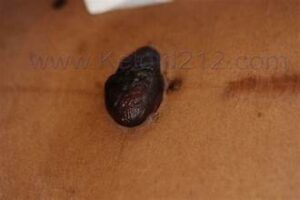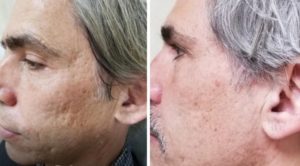Scar and Keloid Removal in NYC
Scar and keloid removal can be both a medical as well as a cosmetic issue. At Aglow Dermatology we offer a variety of medical, minimally-invasive and surgical scar and keloid treatments for whether your scar cause physical or mental pain, diminished function, or you simply don’t like how it looks.

What Is a Scar?
A scar is a natural part of the skin’s healing process after an injury. When the skin is damaged, the body produces collagen fibers to repair the wound, resulting in a scar. While some scars fade over time, others can become raised, sunken, or discolored. Scars can be itchy, painful, or asymptomatic, and while they are permanent, various treatments can improve their appearance and symptoms.
Types of Scars
Understanding the different types of scars is crucial for selecting the best treatment approach.
Atrophic Scars (Sunken or Depressed Scars)
Atrophic scars form when there is a loss of tissue from the skin injury. Common types include:
- Acne Scars: Often appear as pitted or depressed, rolling scars on the face.
- Stretch Marks: A form of atrophic scarring caused by rapid stretching of the skin often caused by pregnancy, or other types of rapid weight gain.

Hypertrophic Scars (Raised Scars)
These scars remain within the boundaries of the original wound but are thick and raised due to excess collagen production.
Keloid Scars (Overgrown Scars)
Keloids are thick, raised scars that extend beyond the original wound area. They can develop after surgery, trauma, piercings, or even minor skin injuries. African American people are more prone to develop keloid scars compared to people of other ethnic groups. Common areas for keloids include:
- Earlobes: Keloids frequently develop on the earlobes after piercings.
- Keloid Scars on Shoulders: These often occur after vaccinations or acne breakouts.
- Abdominal Keloid: Can form after surgery or injury to the abdominal area.
Scar and Keloid Treatments
Although scars are permanent, various treatments can help improve their appearance, reduce discomfort, and prevent further growth. A dermatologist for keloid removal or a keloid specialist can recommend the best option based on your specific scar type:
Corticosteroid Injections
Steroid injections help flatten and soften hypertrophic and keloid scars by reducing inflammation and collagen production.
5-Fluorouracil (5-FU) Injections
5-FU is a chemotherapy drug that, when injected into keloids, helps reduce their size and prevent regrowth, often used in combination with steroids.
Surgical Excision
For larger keloids and scars, surgical removal may be an option. However, excision alone has a high recurrence rate, so it is often combined with other treatments such as radiation or corticosteroid injections.
Radiation Therapy
Low-dose radiation after keloid excision can significantly reduce the risk of recurrence, making it a preferred option for stubborn keloids.
Laser Treatments
Laser therapy can help resurface atrophic scars, reduce redness, and improve skin texture. Different types of lasers are used depending on the scar type. For hypertrophics scars lasers may be used in combination with corticosteroid injections.
RF Microneedling
Radiofrequency microneedling, also known as microneedling rf, is a combination of two technologies that helps stimulate collagen remodeling, improving the appearance of atrophic scars, including acne scars.
Silicone Gel and Sheets
Silicone-based products are commonly used to flatten and soften hypertrophic and keloid scars over time.
Pressure Earrings
For ear keloid removal, pressure earrings (affiliate link) help reduce the recurrence of keloids after excision by applying consistent pressure to the affected area.
Common Types of Scars Treated
- Acne Scars – Sunken or pitted scars from past acne breakouts.
- Surgical Scars – Scars from medical procedures or surgeries.
- Traumatic Scars – Scars resulting from injuries such as cuts, burns, or accidents.
- Scars on Earlobes – Often caused by piercings or trauma.
- Scars from Tattoos – Scarring that occurs after tattooing due to poor healing or allergic reactions.
Scar and Keloid Doctor
If you’re struggling with keloids or other types of scars, our experienced dermatologist specializes in keloid removal and scar treatment. Whether you need ear keloid removal, acne scar removal, treatment for keloid scars on shoulders, or help with an abdominal keloid, we offer customized solutions to help restore your skin’s appearance. Contact us today to schedule a consultation!

